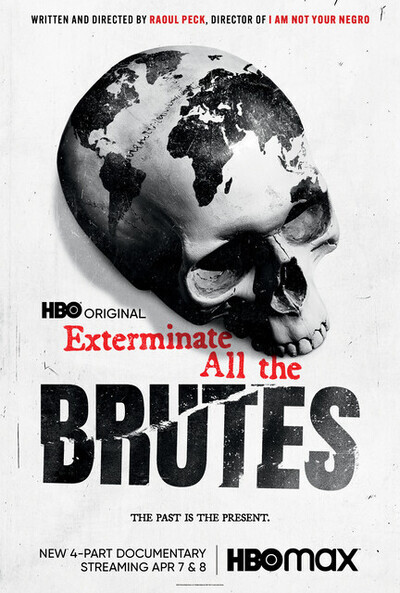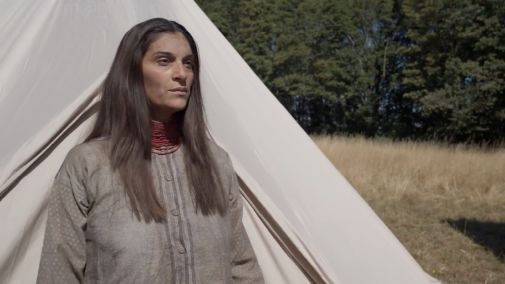By Glenn Dunks
 I suppose I could beat around the bush. I could skirt around the issue and try to temper my praise, worrying that people could accuse me of mere hyperbole. But what’s the point? Instead, I will just say it: Raoul Peck’s new four-part HBO documentary miniseries, Exterminate All the Brutes, is one of the finest works of art I have ever had the privilege to watch. A soaring epic that takes viewers on a journey over thousands of years—at one point to even the dawn of man—through humanity’s worst impulses for racial supremacy and colonial barbarism.
I suppose I could beat around the bush. I could skirt around the issue and try to temper my praise, worrying that people could accuse me of mere hyperbole. But what’s the point? Instead, I will just say it: Raoul Peck’s new four-part HBO documentary miniseries, Exterminate All the Brutes, is one of the finest works of art I have ever had the privilege to watch. A soaring epic that takes viewers on a journey over thousands of years—at one point to even the dawn of man—through humanity’s worst impulses for racial supremacy and colonial barbarism.
Peck pilfers from cinema (classic and otherwise), paintings, photography, music, archival footage, and adds dioramas, animation, graphic aids, anachronistic diversions, and dramatic interpretations. He rips a fierce and violent tear through history, yet with the precision and delicacy of a surgeon with a scalpel...
Peck narrates in a husky voice that sounds stretched to the point of breaking as he recites the evils of genocide committed by man against man -- monsters in human masks.
At four hours, this production is more than just another movie. With a name like that (taken from Sven Lindqvist’s novel, itself borrowed from Joseph Conrad’s The Heart of Darkness that was adapted into Apocalypse Now), you probably have to expect that the Haitian-born filmmaker isn’t just filling in time. Across documentary (like his Oscar-nominated I Am Not Your Negro) and dramatic features (Lumumba and Sometimes in April—one of Idris Elba’s very first roles—maybe his most famous), Peck has infused a truly artistic sensibility with the rigour of confined storytelling.

Allowed the space with Brutes, he has produced something that isn’t just a great piece of filmmaking. Rather, Exterminate All the Brutes is a project of immense scope and powerful intimacy. It’s a work that rattles and hums to its own uniquely experimental beat, richly academic or achingly autobiographical in equal measure. It’s easily the best thing I have watched across any medium since David Lynch’s Twin Peaks revival in 2017, and one of the very finest works of non-fiction I can recall watching. Five stars isn’t enough.
To sit down and write a review is to already admit defeat. How can I give it justice? I don’t fear the skepticism that naturally comes with raves like this. I would probably raise an eyebrow too. Recency bias and cynical motives are so often a part of breathless praise heaped upon even the most accomplished of works. I suppose I just have to ask you to trust me when I say that I am genuine and truly feel this is a work of art that will be with me at the forefront of my mind for the rest of my days. How exciting is that?! It’s not the most entertaining of subjects (although Peck does his best), but it’s great to know that I am still able to experience that feeling of watching something that is so fresh and energizing and replenishes one’s soul (even if it’s about some of the absolute worst atrocities committed on this planet) at the capabilities of film and television. I feel sorry for whatever I watch next.
Peck, in association with authors and friends Michel-Rolph Trouillot, Roxanne Dunbar-Ortiz and the aforementioned Lindqvist, very simply suggests that history is written by the victors. This is not a new thought, of course. But from here he dissects history and the (predominantly white) experience of raping and pillaging lands and its inhabitants by the European caste. He opens episode one with a confrontation between not just colonizing soldiers and Native Americans of the Seminole Tribe, but a confrontation between the audience and the image. A deliberate breaking down of the filmmaking walls from the get-go that provides an immediate entryway for the viewer. Peck offers to take us through the cracks of history that art has too often ignores, misinterpreted, lied about, or turned into historical idols of nationalist identity. It is often a dizzying display of forms that rebuffs typical narrative (the episodic nature of the project allows him leeway in some places that film clearly would not).

Beyond his documentary storytelling, Peck utilises actor Josh Hartnett across all four episodes as a being (or multiple beings?) who appears to shift among place and time but who appears to represent the white colonizer either way. Whether it makes any logical sense to the broader narrative Peck is trying to tell doesn’t really matter. When in one moment towards the series’ end, Hartnett’s everyman appears to perceive the future of what his army’s death and destruction to the Seminole will mean for future generations of contemporary America, he… well who can really tell? The audacity to make a four-hour project with such clear definitions of evil and yet still allow of ambiguity and mystery. His mind, I tell you!
Filmlovers have a wealth of images to consume, from On the Town’s “Prehistoric Man” sequence at its beginning, through Raiders of the Lost Ark, Shoah, Jurassic Park III, The Wizard of Oz, The Triumph of the Will and Peck’s own work. One of its most memorable moments comes early when audio from U.S. presidential inauguration speeches over footage of cotton fields. Graphic and detailed accounts of the violence inflicted upon Native Americans is highlighted by the story of Geronimo; a man who stood in defiance to American colonizers and would become 150 years later the nickname for Osama Bin Laden following 9/11. Curious, no?
Exterminate All the Brutes is a compelling, endlessly fascinating work. I guess you could say that its message is hardly new. But what he has done with it is extraordinary. “When exactly was [America] really great and for whom?” he asks at one point, with plenty of evidence to make it rhetorical. It’s a series that goes beyond the superficial understandings even many left-leaning folks have of history in the year 2021. But it also isn’t just four hours of speechifying from history books. It has wit and style and grace and emotions that explode out of it. It’s messy and maybe convoluted, but so is history. This is an immense piece of work and one that I will take with me moving forward.
Release: Currently streaming on HBO Max.
Emmy chances: I would like to think it could make it into the Documentary or Non-Fiction Series category (last year's nominees included The Last Dance, Hillary and Tiger King), but it's not as glitzy, it's not about famous people, and it's not a hit Netflix series. It deserves to though, as well as directing, writing, editing, music and probably more, but let's be honest the Emmy's have so many categories I have no idea where it would qualify.